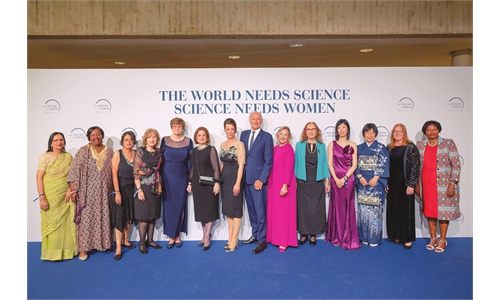Corporate responsibility plays a key role in helping female scientists break the ‘glass ceiling’

Alexandra Palt, chief corporate responsibility officer of the L'ORÉAL Foundation Photo: Courtesy of L'ORÉAL Foundation
The world is facing many challenges, such as climate change, gender discrimination, and loss of biodiversity, which have gradually become major obstacles to social development. The current situation is very critical and serious, so the organization is actively participating in it and taking the social responsibility of responding to it. In recent days, the L'ORÉAL Foundation and UNESCO jointly organized the "World's Outstanding Women in Scientists Achievement Award," which aims to address inequalities faced by women.Women scientists play an important role in health, society and challenges faced by mankind during COVID-19. However, their efforts and achievements often remained overlooked, and there are even many obstacles in their careers and scientific research, according to Alexandra Palt, chief executive of the L'Oréal Foundation.
"These conditions are not just about women, it's also about scientific research. Scientific research has to be inclusive and needs all talent so that science is more valuable and meaningful," she added.
Women should be treated equally
According to a scientific report released by UNESCO in June 2021, although the number of women in research has progressed, the growth rate remains slow. Across the world only 33 percent researchers are female, and only 4 percent of Nobel Prizes in science were awarded to women.
According to Palt, society needs more women to enter the scientific area, but in fact, the "glass ceiling" for female researchers in their careers is a concerning phenomenon. Palt used an example of the development of computer science to clearly describe the unequal treatment that women encounter in the development of scientific research. Since the development of computers in the 1950s and 1960s was still in its infancy, computers were not seen as a highly valuable job, so there were a lot of women in computer science. However, as the industry developed and became a future trend, women were forced out of the industry.
"There were a lot of inequalities in algorithms and artificial intelligence. For example, the first voice recognition application was less sensitive to female voices, and there was a sexist stereotype in picture recognition." Palt thought there were so many reasons people need to value the power of women, and inequality needed to change.
Science needs women's power
It has been extremely challenging for the development of modern science over the past three years, but the advance of women in science has never stopped. They are always at the forefront when dealing with the enormous challenges such as epidemics, diseases, and climate change.
In order to help female scientists break through the "glass ceiling, " L'ORÉAL-UNESCO has launched the "For Women In Science" program to continue to help female scientists gain the social recognition they deserve. According to Palt, the remarkable achievements of women scientists need not only be shared with the world, but society must also remove barriers to the next generation of women entering scientific research, such as providing scholarships to young women to encourage them to continue their scientific career.
"Time is changing and women should confidently demonstrate their expertise and work together to create the future we want." Palt expressed his expectations for the future of women's development, and said that the L'ORÉAL Foundation will also help more female scientists overcome obstacles, pursue the development of science, and promote a better atmosphere in society under his leadership.

